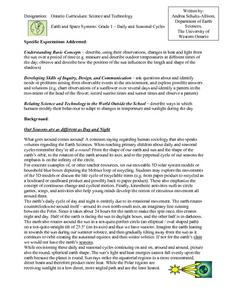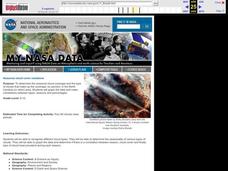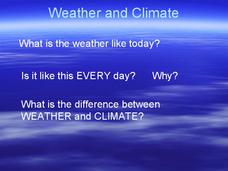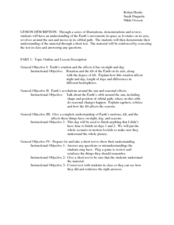Curated OER
Seasons
Students identify and define the vocabulary words: summer, spring, fall, and rotation. They describe how the earth's rotation affects the seasons. Students match appropriate clothing with each season. They discuss why a particular...
Curated OER
Sun Shadow Cycles
Students use diagrams to review how the Earth rotates around the sun. In groups, they use the same diagrams to explain how the sun shadows are produced and how they differ between seasons. They describe the Earth's rotation and...
Curated OER
Science: Daily and Seasonal Cycles
First graders use their observations to describe daily and seasonal cycles. through a demonstration using a suspended ball and flashlight, they determine the time of day in various locations. Next, 1st graders participate in a...
Curated OER
The Four Seasons - Earth's Rotation
Students identify characteristics in correlation with each season and identify dates of the changing seasons. They identify and describe how the Earth rotates around the sun and its effects on the temperatures of the earth.
Curated OER
Reasons for Seasons
Students track photoperiod (daylight hours) over time and predict how daylight change during different seasons. This helps build their understanding that ever-changing daylight is the driving force for migrations and all other seasonal...
Curated OER
Seasonal Cloud Cover Variations
Students recognize different cloud types. They determine the seaonality of various types of clouds. They graph the data and determine if a correlation exists between season, cloud cover and type of clouds most prevalent during each season.
Curated OER
Winter Lights: A Season In Poems & Quilts
Students read the book Winter Lights: A Season in Poems & Quilts and do language arts and math activities that go with the book. In this language arts and math lesson plan, students read the book given and do activities that include...
Curated OER
Shadows
Students measure shadows at different times of the day to determine when a shadow casts its longest and shortest shadows.
Curated OER
Earth and Seasons
Sixth graders comprehend that the path Earth takes as it revolves around the sun is called its orbit. They also comprehend that the axis is an imaginary line that passes through Earth's center and its North and South Poles. Students...
Curated OER
The Seasons
Students determine the effect of the earth's tilt on the amount of incoming solar radiation throughout the year. They simulate the earth's orbit around the sun using a light bulb and a globe to simulate the seasons. Assessment questions...
Curated OER
Seasons in 3D: Student Exploration
In this seasons exploration activity, students review vocabulary and answer prior knowledge questions, then use the Seasons in 3D Gizmo to complete exploration activities.
Curated OER
Celestial Seasonings
Students review and discuss video about the relationships between the Earth, Sun and Moon. They create a HyperStudio stack about the Earth, Sun and Moon including created animation. Students present their finished product to the class.
Curated OER
The Seasons of the Earth
In this seasons instructional activity, 3rd graders study a diagram that shows the Earth's rotation around the sun as it relates to the seasons. They describe the position of the Earth during each season in a short answer format.
Curated OER
Tilted Earth
What causes Earth's seasons? Find out through a series of anticipatory questions, an easy yet powerful activity representing the sun-Earth system, a diagram to label, and follow-up questions. Dispel the misconceptions about Earth being...
Curated OER
Weather and Climate
It's hot today, but is that the weather or the climate? This colorful presentation isolates both concepts to allow for better understanding by covering the positioning of the planet, making comparisons of land versus water, and looking...
Teacher Writing Center
Spring Lesson
Ring in the spring with a study of adverbs. These spring worksheets cover when and how to use adverbs, provide plenty of adverbs to try out, and use images of spring as inspiration for students to tap into as they write original sentences.
Curated OER
Earth's Movement in Space
Students explain how the Earth's tilt and rotation causes night and day. In this earth science lesson, students determine how seasonal changes are caused by Earth's revolution. They play a jeopardy team game at the end of the unit to...
Curated OER
Scientist Tracking Network
Students correlate surface radiation with mean surface temperature of several geographic regions. They observe how these parameters change with latitude and construct an understanding of the relationship of solar radiation to seasonal...
Curated OER
Imagery
Students write using imagery. In this descriptive writing lesson students write a descriptive paragraph about their favorite season. They use a chart to compile words related to their senses and emotions.
Curated OER
Models of the Earth and Moon
Students explore the earth's rotation and phases of the moon. In this planets lesson, students rotate and revolve around a light representing the sun. Students use movement and props to simulate what causes the phases of the moon as well...
Curated OER
It's A Meteor
Young scholars complete a webquest to find Earth's relationship to the sun. In this webquest lesson, students complete tasks to understand the effect of the sun on weather and time. Young scholars create a multimedia presentation as an...
Curated OER
In a Giants Garden
Students explore the effect of the earths rotation and its relationship to the suns position and the effect that the longer and shorter amount of daylight has on a pumpkin plant which they have planted.
Curated OER
Seasons
In this Earth's seasons worksheet, students study the diagram of the Earth's position as it orbits the Sun at four positions. Students then label the approximate date and season for the Northern Hemisphere at each stage. There is a word...
Curated OER
Reasons for the Seasons
Middle schoolers discover how the Earth's axis of rotation affects the angle of sunlight and the length of day. They take a survey and give the survey out to family members and friends. They tally their findings and then determine the...

























